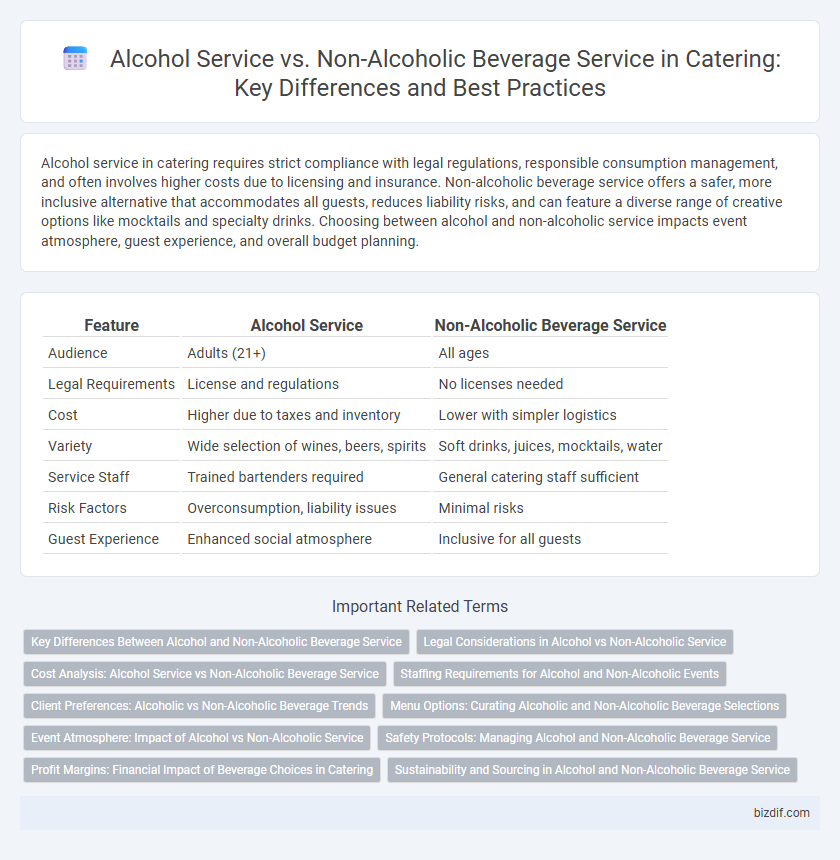Alcohol service in catering requires strict compliance with legal regulations, responsible consumption management, and often involves higher costs due to licensing and insurance. Non-alcoholic beverage service offers a safer, more inclusive alternative that accommodates all guests, reduces liability risks, and can feature a diverse range of creative options like mocktails and specialty drinks. Choosing between alcohol and non-alcoholic service impacts event atmosphere, guest experience, and overall budget planning.
Table of Comparison
| Feature | Alcohol Service | Non-Alcoholic Beverage Service |
|---|---|---|
| Audience | Adults (21+) | All ages |
| Legal Requirements | License and regulations | No licenses needed |
| Cost | Higher due to taxes and inventory | Lower with simpler logistics |
| Variety | Wide selection of wines, beers, spirits | Soft drinks, juices, mocktails, water |
| Service Staff | Trained bartenders required | General catering staff sufficient |
| Risk Factors | Overconsumption, liability issues | Minimal risks |
| Guest Experience | Enhanced social atmosphere | Inclusive for all guests |
Key Differences Between Alcohol and Non-Alcoholic Beverage Service
Alcohol service involves age verification, liability management, and adherence to local alcohol laws, ensuring responsible consumption during events. Non-alcoholic beverage service prioritizes hydration, variety, and inclusivity, offering options like juices, sodas, and mocktails suitable for all guests. Staffing requirements, pricing, and licensing differ significantly between alcohol and non-alcoholic beverage catering, affecting event planning and overall guest experience.
Legal Considerations in Alcohol vs Non-Alcoholic Service
Legal considerations in catering vary significantly between alcohol service and non-alcoholic beverage service, with strict regulations governing the sale, distribution, and consumption of alcoholic drinks. Serving alcohol requires compliance with local licensing laws, age verification protocols, and liability insurance to mitigate risks associated with intoxication. Non-alcoholic beverage service typically involves fewer legal restrictions, focusing mainly on health and safety standards without the need for special permits or age checks.
Cost Analysis: Alcohol Service vs Non-Alcoholic Beverage Service
Alcohol service typically incurs higher costs due to licensing fees, procurement prices, and potential staff training expenses, whereas non-alcoholic beverage service generally requires lower investment with fewer regulatory restrictions. Inventory management for alcoholic beverages demands stricter control, increasing overhead compared to stock for non-alcoholic drinks such as juices, sodas, and water. Analyzing total event spend reveals that beverage costs for alcohol service can be 2-3 times greater than non-alcoholic alternatives, impacting overall catering budgets significantly.
Staffing Requirements for Alcohol and Non-Alcoholic Events
Staffing requirements for alcohol service events demand certified bartenders skilled in responsible alcohol distribution and compliance with local laws, often increasing the staffing ratio due to the need for monitoring intoxication levels. Non-alcoholic beverage service events typically require fewer specialized staff, focusing on servers who can efficiently manage a wide variety of drink options without the legal constraints associated with alcohol. Event planners must consider these differences to ensure both safety and service efficiency, optimizing staff allocation based on the event's beverage offerings.
Client Preferences: Alcoholic vs Non-Alcoholic Beverage Trends
Client preferences in catering increasingly reflect a shift toward diverse beverage options, with a notable rise in demand for non-alcoholic drinks alongside traditional alcoholic offerings. Trends indicate a growing interest in craft mocktails, artisanal sodas, and wellness-focused beverages that cater to health-conscious guests and designated drivers. Balancing alcohol service with high-quality non-alcoholic alternatives enhances event inclusivity and aligns with evolving consumer behaviors.
Menu Options: Curating Alcoholic and Non-Alcoholic Beverage Selections
Curating beverage selections for catering events involves balancing alcoholic options such as craft cocktails, premium wines, and local craft beers with non-alcoholic choices like artisanal mocktails, fresh juices, and gourmet sodas. Thoughtful menu design considers guest preferences, event type, and pairing opportunities to enhance the overall dining experience. Offering diverse and high-quality beverages ensures inclusivity and satisfaction for all attendees while maintaining the event's thematic coherence.
Event Atmosphere: Impact of Alcohol vs Non-Alcoholic Service
Alcohol service at catered events often fosters a lively and relaxed atmosphere, encouraging social interaction and celebration among guests. In contrast, non-alcoholic beverage service emphasizes inclusivity and can create a more controlled, family-friendly environment that suits diverse guest preferences. The choice between alcohol and non-alcoholic options significantly influences the event's tone and guest engagement.
Safety Protocols: Managing Alcohol and Non-Alcoholic Beverage Service
Effective safety protocols in catering require rigorous management of both alcohol and non-alcoholic beverage services to prevent overconsumption and ensure guest well-being. Staff must be trained to recognize signs of intoxication and follow legal regulations on alcohol service, including age verification and responsible pouring techniques. Implementing designated beverage stations and offering ample non-alcoholic options promotes safe consumption and reduces liability risks.
Profit Margins: Financial Impact of Beverage Choices in Catering
Alcohol service in catering typically yields higher profit margins due to the elevated markup on wines, spirits, and cocktails compared to non-alcoholic beverages, which generally have lower costs but slimmer margins. Offering premium alcoholic drinks can significantly boost overall event revenue, making beverage choices crucial for maximizing financial returns. Strategic beverage menus that balance high-margin alcoholic options with appealing non-alcoholic choices optimize profitability while catering to diverse guest preferences.
Sustainability and Sourcing in Alcohol and Non-Alcoholic Beverage Service
Sustainable alcohol service prioritizes sourcing locally produced wines, beers, and spirits to reduce carbon emissions and supports organic or biodynamic farms that minimize chemical use. Non-alcoholic beverage service emphasizes organic juices, fair-trade coffee, and sustainably harvested teas, promoting environmental stewardship and ethical trade practices. Both services benefit from partnerships with suppliers committed to eco-friendly packaging and responsible water usage, enhancing overall sustainability in catering operations.
Alcohol Service vs Non-Alcoholic Beverage Service Infographic

 bizdif.com
bizdif.com